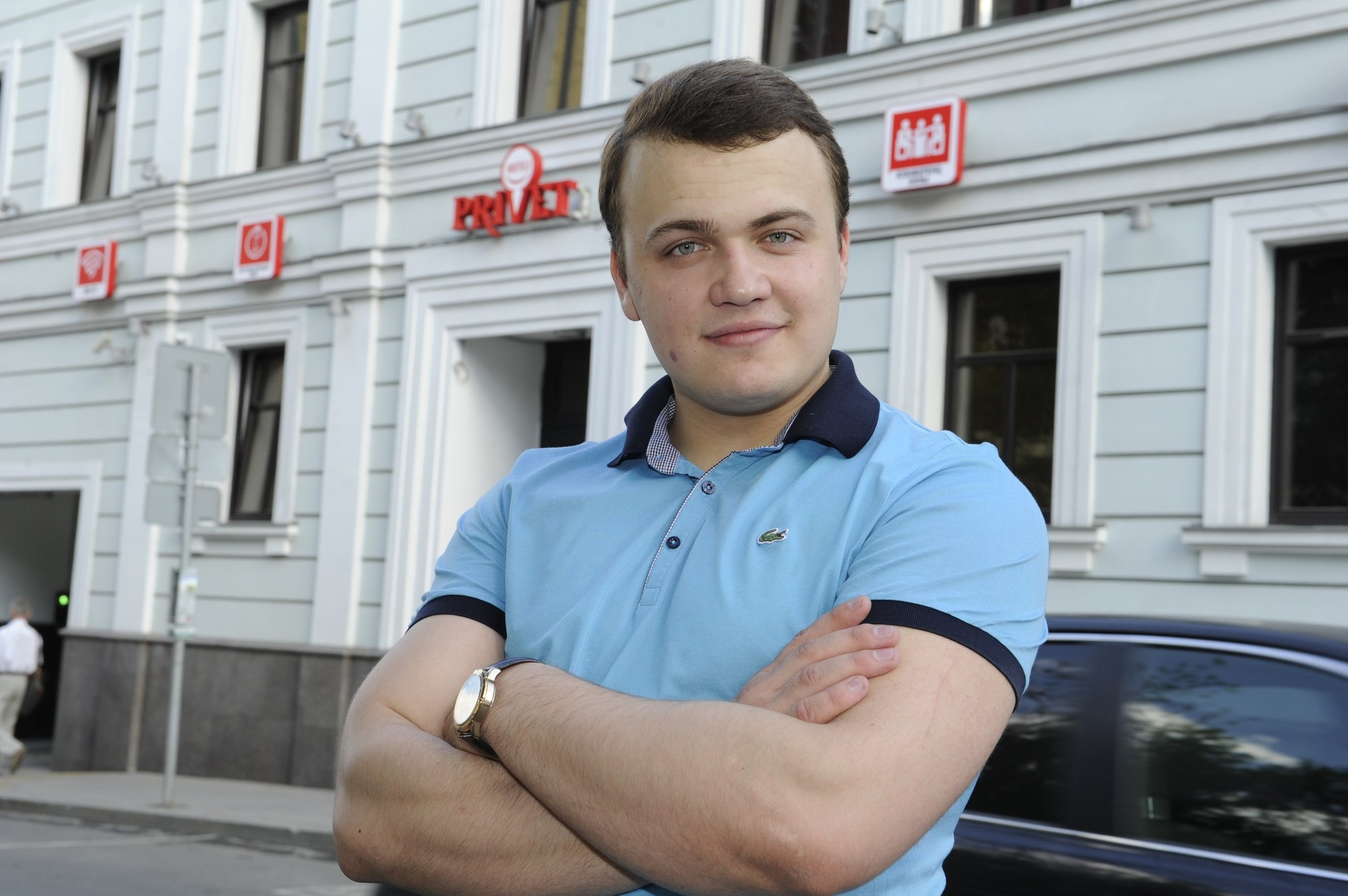
Даниил Мишин — вундеркинд российского малого бизнеса. К 20 годам он создал сеть хостелов.
Kommersant | English Translation
Daniel Mishin is a child prodigy of Russian small business. By the age of twenty, he created a network of hostels (Bear Hostels), became a star of the screen and the start-up community. But in order to create a truly large-scale business, Mishin had to attract investment and lose entrepreneurial freedom.
Here is a three-story apartment house from the 19th century between the Kurskaya metro station and Chistye Prudy, the historical centre of Moscow. Here you’d expect to see a five-star hotel or the central office of a large company, but the entire building is occupied by the Privet hostel with 300 beds - the largest in Russia. “Just listen to the sound, I’m watching a movie here in the evenings,” says Dan Mishin, increasing the volume of the audio system. The hostel has a small cinema, a conference room, a gym, a bar with disco and underground parking. One of the rooms was a children’s playroom, decked with toys and a veranda was built on the roof of the building.
A typical Russian or European hostel is a large apartment where several bunk beds are installed in the rooms, and the infrastructure includes only a shared kitchen and Internet. A typical customer is a student traveller from Europe or the USA.
Mishin came up with a combination of services and low prices, unprecedented for hotel discounters. A bed in a room for seven will cost from 499 Rubles per day, and a double room with amenities costs three thousand Rubles. In Moscow you can find a bed even cheaper (from 250 Rubles), but for the city centre and the range of services offered at Privet, the prices are very affordable.
Privet opened in June 2014, at the peak of the sanctions war between Russia, the EU and the United States. Inbound tourism from Western countries, according to market data, decreased by 30-50% compared to the previous year. In summer, Privet was only 30% occupied – Daniel Mishin expected that there would be many more customers. Now the entrepreneur will have to convince Russian business travellers that hostels are not only suitable for students.
Student paradise
The global hostel market is estimated at $ 136 billion per year - a little less than 20% of the entire hotel market. Hostels are common in European cities: hotels are expensive and there are many young travellers. After graduation, many residents of developed countries go travelling. In Moscow, hostels account for an estimated 3-5% of the market, while low-cost hotels are concentrated in Moscow and St. Petersburg.
Start-up star
“The courtyard is completely ordinary. Fedor Bondarchuk lives in two houses,” Daniel Mishin showed the house on Rublevka to correspondents of the “Let them talk” program two years ago. The show was called "20-year-old millionaires." In 2012 Mishin was exactly twenty, the rest of the stars are older. In truth, he rented a house, and the young businessman could be called a millionaire at a stretch: the annual turnover of his business did not exceed $700K then. The story that Mishin told television reporters is reminiscent of a start-up dream. Here, twelve-year-old Daniel opens the first hostel in the centre of Sevastopol, in the apartment inherited from his Grandmother. At the age of sixteen he goes to conquer Moscow. In 2008, he opened their first Olympia hostel in the capital, in an apartment rented for 100 thousand Rubles on the 4th Tverskaya-Yamskaya. For 450 Rubles per night, they offered housing in walking distance of the Kremlin. Mishin recalls that on the very first day, three people lived in the hostel. Investments were recouped in a few months, and the media got a “hero of our time” - a very young man living on Rublevka, who created a successful business from scratch.
In 2012, Dan Mishin became the Russian winner of GSEA - the international award for young entrepreneurs. "A hyper-bright character. Unlike most entrepreneurs, he knows how to speak very well about his achievements. Mishin was remembered by both the Russian and American juries. He was among the five best entrepreneurs in the world," recalls businessman Sergei Vykhodtsev, founder of GSEA in Russia. But behind the outer gloss were serious problems.
Two years ago, Mishin was at an impasse. In order to create a network of three Bear Hostels in Moscow with 230 beds, he had to cede the majority stake in the project to investors, Moscow bankers, whose names Mishin did not disclose. The business was successful, but the partners of the entrepreneur took all the profits out. “The hostel industry has a low entry threshold: it’s easy to enter and just as easy to exit,” says Mishin. “The business doesn’t seem very complex and attracts a lot of chancers and non-businessmen.”
When Mishin opened his first hostel in Moscow in 2010, he had only six competitors in the capital. In 2012, their number exceeded one hundred, and now, according to Mishin’s calculations, there are about 250 hostels in the city. Every three months, up to thirty new ones open, two thirds of them soon close. Many can find small investments to start with, but the slightest drop in demand turns into a collapse (see the chart).
Bear Hostels also found themselves often living on the edge: due to seasonal factors, hostel occupancy dropped to a critical 50-60%, and the business went into the red. Mishin dreamed of a large operation, a network of tens or hundreds of hostels, but the partners were not going to finance the numerous ideas of the entrepreneur. Daniil tried to develop franchising - he began to prepare a brand book and negotiate with potential franchisees. However, it turned out that there was nothing special to replicate: the hostels were controlled independently. As a result, Mishin limited himself to paid consulting.
After re-reading the book “Atlas Shrugged” by Ayn Rand, Mishin asked himself: “What do I want? Remain in the comfort zone and steadily grow my small business or grow aggressively quickly?” Daniil decided to look for a strong partner. Mishin learned from the press that Merab Ben-El (Elashvili), President of the restaurant holding company GMR Planet of Hospitality, was looking at the hotel market and was interested in hostels. "In Russian cities it is difficult to find a budget hotel with comfort levels matching European standards, but there are no fundamental business reasons why high-quality European hotels shouldn’t exist. I decided to be the first to make a big and exciting impact in this business," Merab Ben-El now argues.
Mishin called Merab’s Assistant, and within a couple of days, the businessmen were in talks. “I saw in Daniil those character traits that were inherent in me. I started my entrepreneurial activity at a very young age, and I earned the first million at nineteen,” Merab Ben-El said. He bought the shares of Mishin’s partners (now the project has only two owners) and connected his organizational resources for the development of the common business. Merab left Daniil as managing partner, suggesting that he first clean up the Bear Hostels network.
3,500 Rubles was the average price of a budget hotel room in Moscow (two to three stars) in the summer of 2014. According to Umbrella Hospitality CIS, occupancy rates of such hotels are about 65%
CEO with a stopwatch
Some Privet rooms are still being renovated. Mishin enthusiastically tells what paintings would be on the walls, how to equip a summer terrace, and complains that the builders have ruined the elevator panels, now they will have to be changed. Suddenly, he notices that a plastic corner fell off the windowsill. Daniil immediately forgets about the correspondent from SF and begins to attach accessories to the place. Mishin himself assembled furniture in his first hostels and stood at the front desk. With the advent of Merab Ben-El among the shareholders, Mishin had to take on a new role - a Manager in a large corporation.
Mishin is a typical start-up. He likes to launch new projects but hates reporting and paperwork. “Small business usually lives on a cash basis: if there is a money surplus - we take it for developments or dividends, if there is no money, we don’t take it. I acted the same way,” Mishin says. Financiers of the "Planet of Hospitality" explained the basics of budgeting to the entrepreneur - Mishin began to prepare financial plans, forecasting income and expenditure. Execution of the plans is controlled by employees of the financial department of the holding company "G.M.R. Planet of Hospitality". "The main lesson I have learned is that you need to calculate cash flows, and not run around the banks looking to plug the gaps," Mishin says.
At the same time, Mishin began to formalise and document all the procedures in the hostels - from guest accommodation to cleaning. For example, the maids in the high season could not cope with the cleaning, they asked for more staff, but then they would have to raise prices. Daniil used a stopwatch to record how much time the maid spent cleaning one bed. It turned out that it takes about five minutes. Mishin thought for several days how to simplify and speed up this procedure. For each employee, he wrote detailed instructions. As a result, the cleaning time was reduced to three minutes.
Major changes have affected marketing and pricing. Previously, Mishin was guided by the prices of competitors and, as a rule, offered beds a little cheaper. “But this is fundamentally wrong. You do not analyze your own profitability, you do not compare it with your tasks,” Mishin complains now. He hired a marketer who monitors demand every day and changes prices and runs special promotions.
The main sales channel for Bear Hostels and all Russian hostels are booking portals like Booking.com and Ostrovok. Mishin began to search for new sales channels. He had previously used social networks and contextual advertising to promote Bear Hostels, but now he began to develop integrated advertising campaigns. Marketers monitor any mentions of Bear Hostels on the Internet and respond to customers if they are not happy with something. As a result, occupancy levels of hostels stabilized at around 80%, the average market level is 15% lower.
Is it awkward for a self-taught entrepreneur to work in a corporation? “Of course, there was some awkwardness from the fact that there was less freedom. But I adjusted. I became a more disciplined person,” Mishin says. “This is a fair price to pay for the investment. If a person gives you money, you need to be accountable.”
48 restaurants were opened last year by G.M.R. Planet of Hospitality. It developed the Sbarro network, Oriental Bazaar, Viaggio, Elki-palki and others. In total more than 300 restaurants.
Last year, Mishin began to prepare plans to scale-up the business and put them before the investor. He has conducted major market research and consumer surveys to forecast the financial model for such a business.
The fact is that hostels in the European Union are run by small entrepreneurs, there are no large chains, and travellers value hostels for their individuality. Owners often stand at the front desk and advise tourists what to see in the city. It is impossible to create a large-scale business that way. At the same time, large chains such as the International Youth Hostel are successfully operating in China and Southeast Asia.
According to the results of the study, it turned out that tourists, choosing a hostel in Russia, look primarily at prices and the quality of services. “I think we will follow the Asian path: two or three large hostel networks will appear in Russia,” Mishin said. He developed a branded network, documented technologies and instructions, and began selling the Bear Hostels franchise from the beginning of the year.
Five franchisees from million-plus cities signed an agreement, all projects are at the launch stage. The hostel franchise in Russia is also offered by the Dostoevsky network from Novosibirsk (with twenty franchisees in the regions). “Demand for the franchise is quite high: many entrepreneurs in this market understand that it is difficult to build an effective business on their own,” says the co-owner of Dostoevsky, Evgeny Grishakov. Mishin plans to develop the network of small 100 bed hostels through franchising, then he will build a network of giant hostels Privet with the money from Merab Ben-El.
The opening of the first one in Moscow took almost a year and $ 2.5 million of investments. “Most of the time was spent searching for premises and negotiating with officials,” Mishin complains. But he managed to attend to the details - he made additional sound insulation between the bar and the rooms and started a chat for residents on the hostel's website so clients can discuss joint excursions.
This is no longer an operation that is easy to open and close without much loss, the payback period for this project is five years. A large hostel can earn on additional services (e.g cafes, parking) and save on economies of scale. According to the SF calculations, the savings reach 20-30% compared with several hostels of the same number of beds. The newly opened hostel already is in fourth place among Moscow hotels on Tripadvisor – Privet’s rating is 10 out of 10. On Booking.com, the hostel’s rating is 9 out of 10.
High ratings are not yet a guarantee of an influx of customers, and filling a large hostel is more difficult than a small one. The summer season has actually failed. Mishin’s solution is to attract business tourists from Russia to Privet. At Bear Hostels one third of clients are business travellers, Daniil estimates that the proportion of businesspeople in Privet will be much higher. Unlike student travellers – (typical hostel customers), business travellers need breakfast and a conference room, all of this is at Privet.
“The manager lives in a double room, subordinates live in quadruple rooms with colleagues. And all this is several times cheaper than in the cheapest hotel in the outskirts,” Mishin argues. “We assumed that the audience was ready, because now everyone is trying to save". To lure business tourists, he gives discounts of 20-30% to large groups. “Privet is ideal for gathering various youth movements and training camps,” said Fedor Yegorov, Ostrovok Hotel Manager. However, Mishin’s hypothesis has not yet been confirmed: few are willing to live in the same room with colleagues when the employer pays. The proportion of business travellers in Privet is now at about the same level as in Bear Hostels - 30%.
This is clearly not enough to compensate for the decline in inbound tourism. However, the problems of the first giant hostel do not stop Merab Ben-El. Before the World Cup in 2018, he is ready to spend 3 billion Rubles on the opening of 20 large hostels in million-plus cities, fifty three-star hotels with 150 rooms each and fifty roadside motels. The senior partner of the child prodigy Mishin obviously does not suffer from a lack of ambition. Only political risks can hinder him - the fate of the football championship in Russia hangs in the balance.
A large hostel offering a wide range of services has good prospects for sales growth, even in an economic downturn. It is much easier to promote, since dozens of different activities for different target groups are possible within the framework of this project. Special offers such as "youth wedding", children's and sports parties, music and club events can be attended not only by guests, but also by residents of the surrounding areas. The goal of the hostel is to become a focal point for a youth audience. If we talk about the disadvantages of this format, there may be difficulties in the clients' perception of the concept itself. Low prices can equal low quality services in the minds of guests, so it is important to find the right balance, representing value for money.




